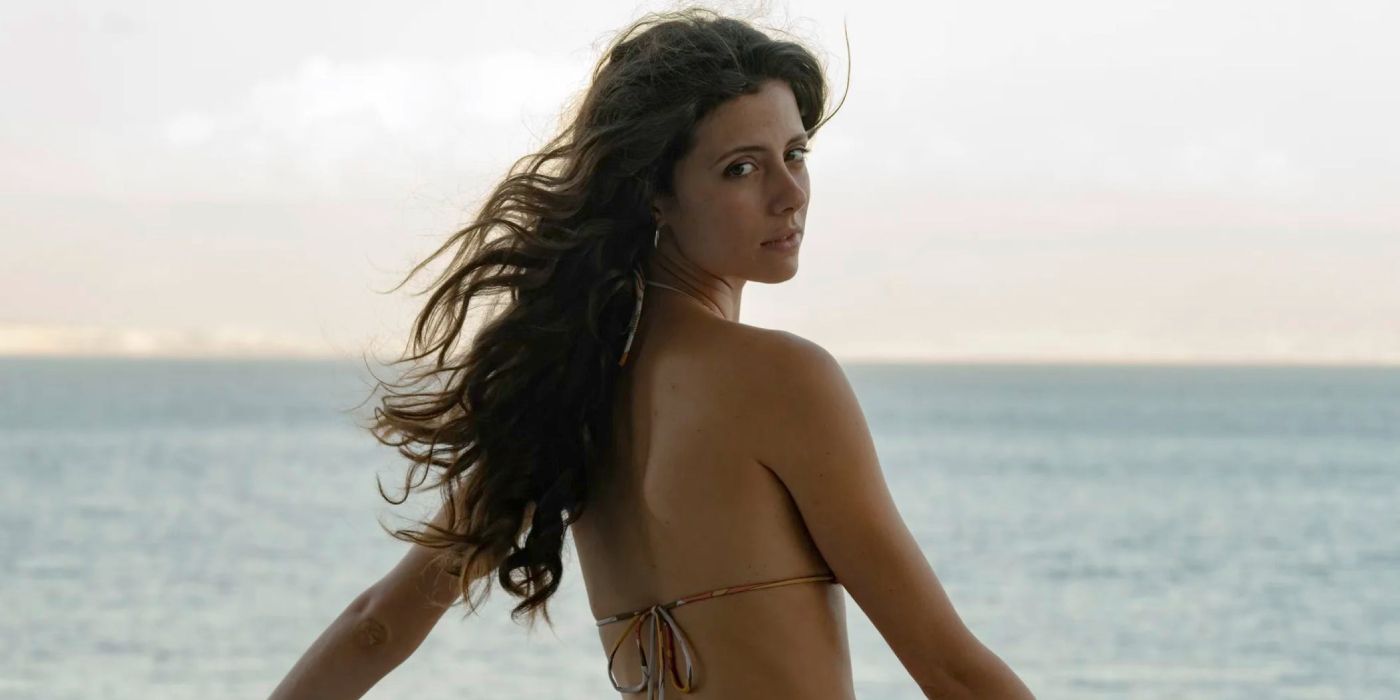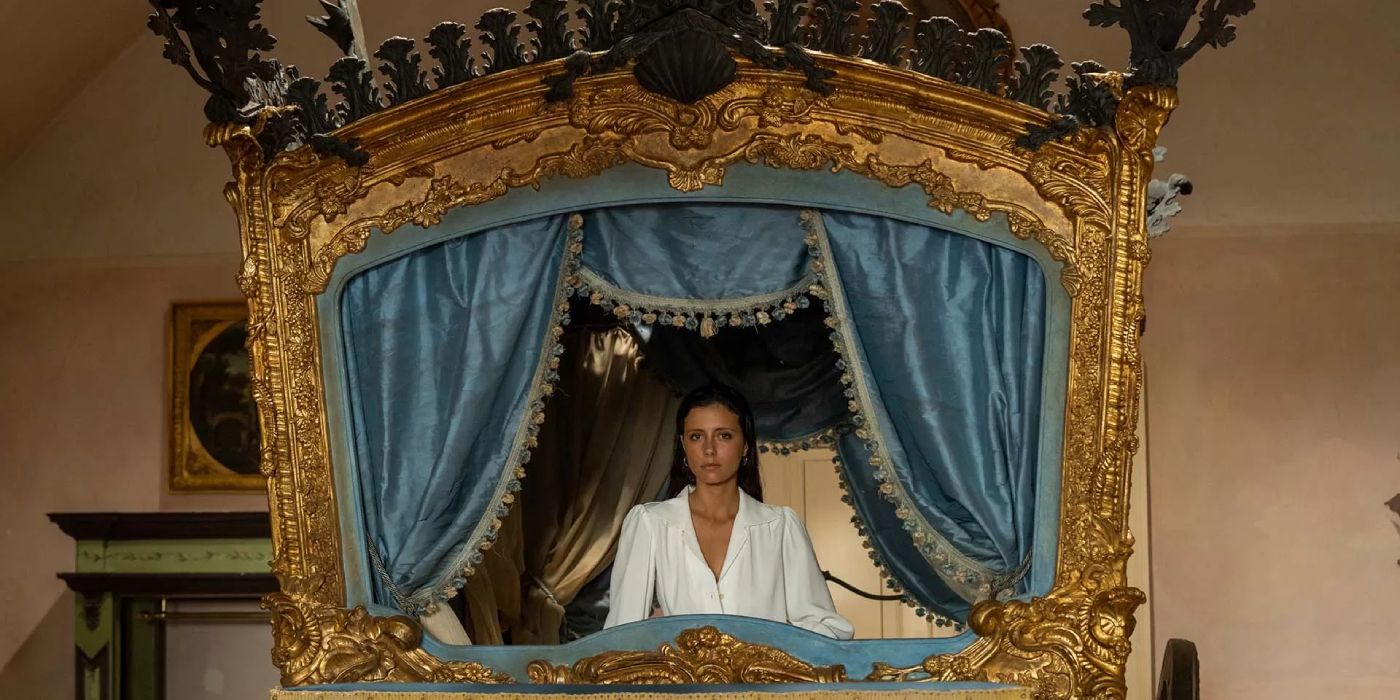
The name “Parthenope,” when properly spoken in Italian, is a stunning four-syllable moniker befitting the captivating heroine from Paolo Sorrentino’s latest film. A brief investigation uncovers that this name shares a connection with Naples and refers to a Siren from Greek mythology who failed to charm Odysseus. Given this background, it’s plausible to speculate that Sorrentino’s upcoming drama may carry elements of tragedy.
Perhaps you’ve seen A24’s promotional trailer for the film “Parthenope” more than a dozen times, and Celeste Dalla Porta’s extraordinary beauty in the lead role has caught your attention. This striking but troubled character is at the heart of this long journey, filling the expansive 137-minute runtime of “Parthenope“.
Similar to his 2013 masterpiece, The Great Beauty, Sorrentino’s new film, titled Parthenope, showcases an undeniably Italian vibe. However, it doesn’t quite reach the heights of its predecessor. The movie is a tribute to the Greek tragedies, exploring how superficial beauty can impact the environment around us, sometimes positively and other times catastrophically. The film’s length might lead you to question when it will finally conclude, as it seems to drag on at times, not just because of its tragic themes but also due to its extended runtime. In essence, Sorrentino continues to offer more, whether it’s intriguing or tiresome, and this can become wearing by the end.
Tragedy, Oldman & More
The movie by Sorrentino is aptly named after its central character, and there are several reasons for this. For instance, it opens during the year of her birth (1950), which symbolically occurs in the ocean itself. In the opening scene, nurses assist Parthenope’s mother to deliver the baby girl into the sea, creating an illusion that a mermaid is emerging from the water. Given the location of Naples, where much of the film takes place by the beach, it seems fitting that Parthenope appears as if she originated from the sea herself.
The narrative quickly jumps ahead by 17 years to depict teenage Parthenope (played by Dalla Porta), often seen in a bikini, moving between her seaside home and its surroundings alongside her brother Raimondo (performed admirably by Daniele Rienzo). Their relationship as siblings appears intimate and somewhat unusual, causing discomfort for some viewers, as an undercurrent of potential romantic tension develops between them as they mature into their twenties.
Similar to Sorrentino’s previous screenplays, the dialogue in his newest work is brimming with dryly comedic remarks, notably when a continuous procession of admiring men attempt to win over Parthenope’s hand. However, there are also extended sequences devoid of dialogue, creating a cinematic experience that would appeal to filmmakers like Paul Thomas Anderson, who has expressed interest in crafting a feature solely based on visuals and music (perhaps the reason behind Anima‘s existence). Notably, Sorrentino allows some crucial events in his latest narrative to unfold without any dramatic verbal interaction, offering a refreshing break from what North Americans are often accustomed to.
From my perspective as a movie critic, let me remind you that our captivating lead character is deeply rooted in Greek tragedy, ensuring poignant moments of heart-wrenching sorrow will undoubtedly unfold, propelling Sorrentino’s intricate narrative along. The presence of the esteemed Oscar winner, Gary Oldman, adds a touch of brilliance to the storyline as he portrays a tormented alcoholic who encounters the free-spirited Parthenope during one of her spontaneous escapes from her possessive lover, Sandrino (Dario Aita). Despite his advanced years and dismal state, the enigmatic John Cheever (Oldman) advises young Parthenope not to squander a single moment of her youth with him, even as she is inexorably drawn to him by her insatiable curiosity.
Missed Opportunities & Divisive Choices



Her fascination with the human condition guides the intellectually curious Parthenope towards higher education, where she enrolls at a distinguished university, renowned for its anthropology department headed by the brilliant yet humorously dry professor Devoto Marotta (played by Silvio Orlando, who also shines in Sorrentino’s acclaimed series The Young Pope). This stern family man eventually develops a mentor-student relationship with Parthenope, albeit with initial hesitation. Her academic pursuit culminates in a thesis that involves a seductive bishop (portrayed by Peppe Lanzetta, adding an extra dash of humor to the otherwise somber cast), leading to a complex and sexually charged dynamic. This relationship has ignited controversy among Italian Catholics regarding Sorrentino’s latest work, causing an uproar both domestically and abroad.
The cinema excels when it provokes insightful discussions and, apart from that, the complex romantic ties that characterize Parthenope’s journey may not be captivating enough for dedicated movie enthusiasts. Some of these connoisseurs might also find it hard to embrace an extraordinary, shocking revelation towards the end of the film when professor Marotta confides in Parthenope about his personal life. Climactic scenes such as this, including a sudden flash-forward featuring elder Parthenope (portrayed by Stefania Sandrelli, an interesting casting decision) might perplex many, especially mainstream viewers.
As a lover of cinematic art, I must say that, despite its appeal to an arthouse audience, this film seems to stretch into a lavish, two-hour commercial celebrating the very essence of beauty, as if director Sorrentino were saying, “Look at the most radiant 27-year-old on Earth!” Yet, he’d undoubtedly emphasize that his latest masterpiece transcends such superficialities. He might argue it’s a profound journey for a heroine whose breathtaking beauty leaves an indelible mark on everyone she encounters, influencing characters like the quirky acting mentor (Isabella Ferrari) and the once-illustrious stage star (Luisa Ranieri). A modern reinterpretation of Greek tragedy and mythology in its purest form.
In a fascinating twist, the film Parthenope assumes an intriguing meta perspective, particularly when the promising actress Dalla Porta looks directly at us from the screen, inviting us to explore her portrayal of Naples’ charm. However, some may choose to decline once the credits roll – yet we eagerly anticipate what lies ahead for “the great beauty.” From A24, Parthenope is set to hit theaters this Friday.
Read More
- Ludus promo codes (April 2025)
- Cookie Run: Kingdom Topping Tart guide – delicious details
- Unleash the Ultimate Warrior: Top 10 Armor Sets in The First Berserker: Khazan
- Cookie Run Kingdom: Shadow Milk Cookie Toppings and Beascuits guide
- Grand Outlaws brings chaos, crime, and car chases as it soft launches on Android
- Grimguard Tactics tier list – Ranking the main classes
- Fortress Saga tier list – Ranking every hero
- Tap Force tier list of all characters that you can pick
- ZEREBRO/USD
- Val Kilmer Almost Passed on Iconic Role in Top Gun
2025-02-03 17:02